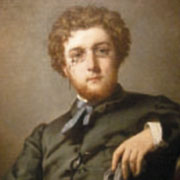The source material of Georges Bizet’s opera Les Pêcheurs de perles” is tricky, as the autograph manuscript is not available. Hugh Macdonald has nevertheless prepared a new edition for which a violin-conductor’s score revealed important information.
It is well known that all Bizet’s operas were subjected to attempts to “improve” them after his death, and that most of the published scores do not give Bizet’s original text. For Carmen there now exist a number of modern editions that distinguish Bizet’s own version from that of later hands, but in the case of Les Pêcheurs de perles, only the first edition of the vocal score, published by Choudens in 1863, gives the text of the opera as Bizet wrote it. All later vocal scores revised the text in important ways. The full score was printed by Choudens in 1886, with a revised issue in 1893, but both these scores show heavily revised versions of the opera. As a result, we do not have Bizet’s orchestration of those sections of the opera which are missing from Choudens’ full score.
In these circumstances a correct full score of the opera could normally be published on the basis of the autograph manuscript. But the difficulty with Les Pêcheurs de perles is that the autograph is in private hands and is not likely to be accessible to scholars for many years. Earlier attempts to provide a complete text have offered new orchestrations of the missing passages on the basis of Bizet’s vocal score, which is an acceptable solution. But a much closer approximation to Bizet’s scoring can be arrived at by consulting a manuscript of the opera held by the Bibliothèque-Musée de l’Opéra, Paris, deriving from the original performances of the opera at the Théâtre-Lyrique in 1863. This is a “Violon-Conducteur” score, used by the conductor in the theatre: a reduction on six staves showing the principal wind and string entries and important elements of the orchestration not specified by the vocal score. In addition this Violon-Conducteur includes certain passages which were cut from the opera before the vocal score was printed.
The new Bärenreiter edition establishes the text of the opera as Bizet wrote it, with certain parts of the opera newly orchestrated by the editor Hugh Macdonald on the basis of the vocal score and the Violon-Conducteur. The most important of these passages are
1) the close of the opening scene, in which it has become traditional to reprise the duet for Nadir and Zurga “Oui, c’est elle, c’est la déesse” instead of Bizet’s version which deliberately leaves the duet as a tantalising glimpse of the beautiful girl they have both forsworn.
2) Two sections in the duet for Leïla and Zurga in the first tableau of Act III.
3) Part of the Chœur dansé “Dès que le soleil” in the second tableau of Act III.
4) The original ending.
The new edition also shows, in an Appendix, the text of spoken dialogue that was replaced by recitatives before the 1863 performances, also the passages in the Violon-Conducteur score that were cut before those performances and which have not been published before.
The inauthentic versions of the opera that were published after Bizet’s death are shown in another Appendix. These include a Trio composed by Benjamin Godard and the two different endings, neither of them by Bizet, given in the two editions of the Choudens full score.
An additional Appendix provides a new edition of the timpani part. Although he was a master of orchestration, Bizet was notoriously unconcerned about the pitches of the two drums available to his timpanist. The vocal score shows that he often intended the pitch to be other than the one available at the time, and there are frequent collisions with the prevailing harmony. Allowing the use of three modern tunable drums, the editor has rewritten the timpani part for present-day use. An English translation for singing is included in the score and the vocal score version of the new edition.
With this new edition, conductors and stage-directors will be able to plan a performance of Bizet’s youthful masterpiece with the full information concerning authentic and inauthentic versions of the opera.
Hugh Macdonald
(from [t]akte 1/2014)



